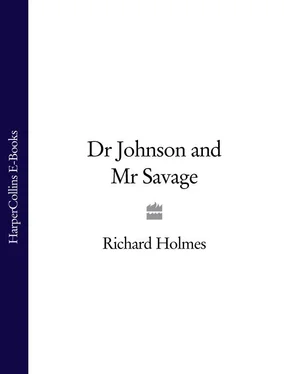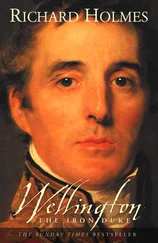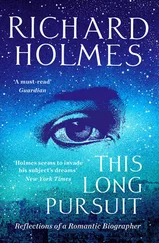This, with its touch of horrified exaggeration, is almost worthy of Hogarth. The detail of the hair, ‘stiff and straight’, worn without a wig, and yet combed self-consciously behind, is curiously disturbing; and perhaps there is a grotesque hint, through Lucy’s eyes, of the suitor. Lucy recalls her mother’s extraordinary reaction: ‘this is the most sensible man that I ever saw in my life.’
Anna Seward was quoting a Lichfield tradition that Johnson was first in love with Lucy. She goes on to suggest, by way of proof, that Johnson’s poem ‘On a Sprig of Myrtle’ was written for Lucy, and given to her around 1733. Boswell ridicules this, and is able to show conclusively that the poem was written before they met, in 1731, and at the special request of a quite different friend of Edmund Hector’s – a Mr Morgan – who ‘waited upon a lady’ in the neigh-bourhood. At Boswell’s urgings, Hector even produced an original manuscript dated 1731. There biographers have left the matter. 34
No one has considered that Johnson may later have given the same poem, or a version of it, to Lucy Porter as well, exactly as Anna Seward claims. The poem is about the ‘ambiguity’ of love, as summed up in the emblem of the myrtle which can mean many things in lover’s lore:
The Myrtle crowns the happy Lovers heads,
Th’ unhappy Lovers Graves the Myrtle spreads;
Oh! then the Meaning of thy Gift impart,
And cure the throbbings of an anxious Heart … 35
Anna Seward’s account of its presentation to Lucy, written privately to Boswell, is particularly insistent:
I know those verses were addressed to Lucy Porter, when he was enamoured of her in his boyish days, two or three years before he had seen her mother, his future wife. He wrote them at my grandfather’s, and gave them to Lucy in the presence of my mother, to whom she showed them on the instant. She used to repeat them to me, when I asked her for the Verses Dr Johnson gave her on a Sprig of Myrtle, which he had stolen or begged from her bosom. We all know honest Lucy Porter to have been incapable of the mean vanity of applying to herself a compliment not intended for her. 36
It seems unlikely that Anna Seward was muddled about the particular poem, or that she should be completely wrong about the general direction of Johnson’s feelings.
At all events, when Harry Porter suddenly died and was buried on 5th September 1734, the situation evidently changed. Elizabeth was now a widow, with a small family fortune of £600, a lively interest in books and a desire for solace. Johnson and she clearly enjoyed each other’s company; both were to some degree eccentric Physical passion emerged on both sides, and Johnson would later insist, ‘with much gravity’, that it was ‘a love-marriage’ for both of them. 37
Mrs Porter was a vivacious woman with a well-rounded figure, a mass of blonde hair and a large maternal bosom. She dressed well, used make-up, lived quite expensively and liked to talk and tipple in the evenings. Johnson, starved for love and intelligent conversation, childlike and shy in his affection, punished for his physical ugliness, was slowly captivated over the next eighteen months. He must have given up any hope he may have had for children of his own. He abandoned, at least temporarily, his dream of the princess.
Instead, it was agreed as part of the marriage contract that Mrs Porter would invest her money in the school at Edial. When the forthcoming wedding was announced, all the Porter relations were appalled; her older son Jervis (then training for the Navy) refused ever to see his mother again, while the younger, Joseph, was unreconciled for many years. 38 Only Lucy stood by her mother and tenderly accepted her outlandish stepfather.
Lucy Porter never married subsequently. Her sweet nature, her shyness and her loyalty to Johnson became proverbial. 39 He later told Mrs Thrale how he would always get Lucy on his side when he had an argument with his wife. 40 She also became the one person who could manage his old mother at Lichfield, and eventually ran the bookshop, the accounts, and the whole household there when Johnson had left for London. Lucy ultimately became like a beloved younger sister to him: a confidante in all matters, financial and emotional, and in some ways closer to him than his wife.
Elizabeth Porter was, after all, much nearer to his mother’s generation; and in the London years one can sometimes glimpse Johnson confiding to Lucy behind the backs of the two elder women simultaneously. With Lucy, he is familiar, teasing, self-revealing in a way that appears nowhere else in his early life; and certainly not in the few known letters to Elizabeth Porter. His manner can be quite startling.
When Lucy’s rich uncle, Joseph Porter, died in 1749, and Lucy wrote to Johnson about family business using a black wax on her letter seal, he replied: ‘You frighted me, you little Gipsy, with your black wafer, for I had forgot you were in mourning and was afraid your letter had brought me ill news of my mother, whose death is one of the few calamities on which I think with horror. I long to know how she does, and how you all do. Your poor Mamma is come home but very weak yet I hope she will grow better, else she shall go into the country. She is now upstairs and knows not of my writing.’ 41
It is only a glimpse, but it is expressive of much: the tenderness, the confidentiality, the sense of Johnson and Lucy coping together with two elderly mothers who can cause such anxiety and heartache. Sarah Johnson was then eighty, and Elizabeth Porter sixty. It is an obvious question to ask, from all this, how far Johnson had actually married not a princess, but a mother-figure.
There are many anecdotes of Johnson and Elizabeth together – from Garrick, from John Taylor, from Mrs Desmoulins, from Hawkins – nearly all of them in a vein of high, and sometimes cruel, sexual comedy, which encouraged Boswell to dismiss the whole question of Johnson’s romantic nature. 42 It comes across as a grotesque liaison – ‘tumultuous and awkward’ – viewed through a biographical keyhole. Taylor put it most bluntly of all: ‘She was the plague of Johnson’s life, was abominably drunken and despicable …’ 43
In later life, Johnson would endlessly, loyally and guiltily profess his undying affection for his ‘Tetty’. There are huge contradictions in the evidence. But it seems that one of the reasons that Johnson left Lichfield for London in 1737, besides the search for a regular income, was to escape both his wife and his mother. And perhaps to dream, once again, of a princess.
All this begins to suggest a young Johnson quite different from Boswell’s sage, with his dry epigrammatic resignation about marital infelicity – second marriage is ‘the triumph of hope over experience’, and so on. Indeed, the purely external facts of finance and domesticity suggest a clear pattern of romantic disenchantment during the first decade or so of the marriage.
Once Johnson had used up the bulk of Elizabeth’s £600 dowry on the failed school at Edial, he contrived to live apart from her for steadily increasing periods of time. Edial failed in the autumn of 1736, and Johnson left for London the following March, remaining away for six or even eight months, much longer than a professional reconnaissance of the capital could possibly have required.
This was the first significant absence, but others soon followed. Having brought Elizabeth back to London at the end of 1737, he established her in relatively comfortable West End lodgings at Castle Street, off Cavendish Square. But by winter 1738 Johnson was again drifting away, using separate rooms off Fleet Street, or at least spending many nights away. Boswell denies this, but Hawkins seems definite on the point and speaks of a ‘temporary separation’. 44 Modern biographers concur ‘Everything we can piece together about Johnson’s own way of living, at least by the winter of 1738—39, indicates not merely that he was living elsewhere, probably in or near Fleet Street, but also that he sometimes even roamed the streets without settled lodging.’ 45
Читать дальше












